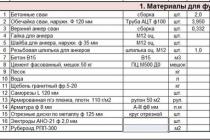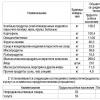What is the reporting and settlement period for insurance premiums in 2020? What are these periods? This is discussed in detail in this article.
Reporting and settlement period in the Tax Code of the Russian Federation
In 2020 in tax code chapter 34 continues to apply" Insurance premiums". This chapter includes articles 419-432, which regulate the rules for calculating and paying insurance premiums. This chapter of the Tax Code of the Russian Federation, in particular, defines the concepts of the reporting and settlement periods for insurance premiums in 2020. These concepts are disclosed in article 423 of the Tax Code of the Russian Federation, namely:
- reporting periods are the first quarter, six months, nine months calendar year;
- The accounting period is a calendar year.
For payers of insurance premiums, these periods are needed to summarize the payment of premiums.
During the billing period of 2020, the accountant must form the basis for calculating insurance premiums (clause 1, article 421 of the Tax Code of the Russian Federation).
Billing period consists of four reporting periods. At the end of each reporting period, subtotals are summed up on the payment of insurance premiums, and reports are prepared, which are submitted to the tax office.
Billing period in 2020
The settlement period for pension, medical and insurance contributions for disability and maternity in 2020 is a calendar year (clause 1 of article 423 of the Tax Code of the Russian Federation). Based on its results, the formation of a base for these contributions for the year is being completed, and the amount of contributions payable is finally determined. Accordingly, in 2020 the billing period will begin on January 1 and end on December 31, 2020.
Vladimir Ilyukov
To determine the billing period is the first task that the calculator must solve when calculating vacation or in other cases of maintaining average earnings. All cases when an absent (non-working) employee is kept average earnings, installed in different places of the Labor Code of the Russian Federation. Here is some of them.
- Annual paid leave, Art. 114 of the Labor Code of the Russian Federation.
- Compensation for unused vacation, Art. 126-127 of the Labor Code of the Russian Federation.
- Additional study holidays, Art. 173-174, 176 of the Labor Code of the Russian Federation.
- Business trips, Art. 167 of the Labor Code of the Russian Federation.
- Downtime due to the fault of the employer, Art. 157 of the Labor Code of the Russian Federation.
- Advanced training, Art. 187 of the Labor Code of the Russian Federation.
- Donation of blood and its components (days of donors), art. 186 of the Labor Code of the Russian Federation.
- Severance pay in connection with dismissal due to the liquidation of the organization, reduction in the staff (number) of employees, conscription of the employee for military service; Art. 178 of the Labor Code of the Russian Federation.
- And other.
To determine the size of the average wages(average earnings) for all these cases, a single procedure is established, Art. 139 of the Labor Code of the Russian Federation. At the same time, according to par. 7 art. 139 of the Labor Code of the Russian Federation, the features of calculating average earnings are regulated by Decree of the Government of the Russian Federation of December 24, 2007 No. 922 “On the Peculiarities of the Procedure for Calculating Average Wages”, hereinafter Decree No. 922.
At a superficial analysis, it seems that the phrase " … or for a period longer than the billing period ” seems redundant, erroneous, not logical. This conclusion can be reached if by "period exceeding the billing period" we mean months outside the base billing period. If we count from the month of the event in which the average earnings are maintained, then this is the 13th, 14th or other month.
This is a misunderstanding. Here the period exceeding the main billing period is understood as the entire period preceding the period of maintaining average earnings . Consider a fairly typical situation for an employee of the organization.
- 06.2016 . Employment date.
- 11.2016 to 16.04.2017. period of maternity leave; 140 calendar days. The child was born on 02/07/2017.
- 04.2017 to 07.08.2018. The period of parental leave is up to 1.5 years. We believe that the employee did not take leave to care for a child under three years old.
- 08.2018 . From this date, the employee goes on another paid vacation.
The example data is illustrated in the following figure.

In this figure, the months of the main billing period are shown on a yellow background. This is the period from 08/01/2017 to 07/31/2018. The period that exceeds the main billing period is the period from 11/01/2016 to 07/31/2018. The hexagons representing the months of this period are filled in grey.
Settlement period for calculation annual leave employees includes the months from 11/01/2015 to 10/31/2016. They are marked with blue hexagons.
Situation 4: there are accruals only in the month of going on vacation
Verbatim quote, paragraph 7 of Resolution No. 922.
“If the employee did not have actually accrued wages or actually worked days for the billing period and before the start of the billing period, the average earnings are determined based on the amount of wages actually accrued for the days actually worked by the employee in the month of the occurrence of the event, which is associated with the preservation of the average earnings"
For example, an employee was hired on April 10 current year, and on April 25, he was granted paid leave in advance. A more realistic situation is when an employee, on the day of hiring, goes, for example, on a business trip. The settlement period is equal to the period from April 10 to April 24 inclusive.
Situation 5: there is no billing period
Clause 8 of Decree No. 922 provides for a rather rare situation.
“If the employee did not have actually accrued wages or actually worked days for the billing period, before the start of the billing period and before the occurrence of an event with which the preservation of average earnings is associated, the average earnings are determined based on the tariff rate established for him, salary (official salary) ".
It is difficult to imagine a case when an employee takes another vacation on the day of hiring, but theoretically it is possible. A more realistic situation is when an employee, on the day of hiring, goes, for example, on a business trip. In this case, there is no billing period.
Conclusion
The article deals with situations in relation to the standard duration (12 calendar months) of the billing period. However, all of the above is true for any other duration of the billing period. It is only important to remember that if an organization applies a billing period other than 12 calendar months, then the corresponding decision should be reflected in collective agreement or in a local act, par. 6 art. 139 of the Labor Code of the Russian Federation.
It is not necessary that all months of the billing period be fully worked out. When calculating annual leave or compensation for unused vacation, the average monthly number of calendar days in the billing period is used to determine the average earnings. A separate article will be devoted to this issue.
If necessary, the billing period is shifted by 12 months only if there are no accruals in the base billing period; situation 2. In other cases, it is shifted back to the first month inclusive, in which there are accruals taken into account in average earnings, situation 3.
A debit card is a convenient tool for everyday payments. To get the maximum benefit from its use, you need to know some concepts that allow you to adjust your actions, fulfill the conditions of the bank and receive bonuses.
Calculation of bonuses such as free service, cashback, accrual on the balance, etc., for the Tinkoff card product is based on payment transactions for a certain period.
What is a debit card billing period?
This is a time interval during which the client conducts various operations, makes payments, opens and closes deposits, arranges loans, or simply stores a certain amount of his personal money. This is necessary to calculate the amount of bonuses received or to write off the annual service fee.
When does the billing period start?
The start date of this period is individual for each client. It depends on the day on which the statement is generated. You can find out the date by calling the customer service center, in your Internet bank or in the statement you have already received. The date indicated after the phrase "for the period from ..." will be the beginning of the settlement period.
AT individual cases it can start at the beginning of a new month.
This date can be changed by calling hotline bank (the offer is considered individually).
How long is the billing period and when does it end?
Billing period debit card lasts one month or 30 days from the date indicated in the statement. For example, the extract indicates the date “from May 5, 2014 to June 4, 2014” or “from August 28, 2014 to September 27, 2014”, etc.
New countdown for expense transactions will start from the same number as the previous one. For example, the last one lasted from November 16, 2014 to December 15, 2014, which means that the new one will start on December 16, 2014.
What is a billing period?
Debit card billing period for accruing annual service.
The cost of servicing a TCS debit card account is 99 rubles. per month. However, if during the spending period the cardholder opened a deposit, had an active cash loan in rubles or an account balance in the amount of 30,000 rubles, then this money will not be charged from him.
For the first month, the customer will be charged the cost of the service. For the following months it will depend on compliance with the specified conditions.
It turns out that if you just keep on your account from 30,000 rubles, then you can use it for free. The advantage is that if you make a deposit, you can still receive interest. It is important to know that this balance will be taken into account at the end of each day, and if on one day the required amount turns out to be less than even a penny, then the client will be charged a service in the amount of 99 rubles.
Settlement period for calculating interest on the balance of the account.
You can receive additional interest without even opening a deposit. If during the spending period the user has on the card account from 0 to 300,000 rubles, then the TCS charges 8% (now the income has been increased to 14%).
If the amount is more than 300,000 rubles, then the client will be able to receive only 4% on the balance. The bank will accrue the same percentage on the balance if no payment transactions were made on the card account during the billing period. It is worth knowing that only purchases of goods using plastic or its details are taken into account. Transactions such as payment mobile communications, Internet, transfers to electronic accounts and other transfers will not be counted. If the transaction has passed, but has not yet been processed by the bank, then it is also not protected.
Accrued interest is paid on the date the statement is generated.
Settlement period for accrual of the cashback bonus.
Cashback is credited on each last day of the spending period. At the same time, its size cannot exceed 3,000 rubles. (anything higher is burned). If the client has several cards, and the total cashback exceeds this threshold, then it will be credited in proportion to the money spent.
Cashback is calculated based on:
- 1% for all payment transactions during the billing period (max. RUB 3,000)
- 5% for increased bonus categories (they change at the discretion of the TCS, for example, in October, November and December 2014 - these are gasoline, car services, pharmacy chains, transport) (max. 3,000 rubles)
- Up to 30% according to the special offers of the bank's partners (they can be activated in your online account or in the application for a mobile device). If a refund was made under the special offer, and the client has already received a reward, the bank will write off the accrued bonuses from the account. Maximum size bonuses can be 6,000 rubles. If a client has several TCS cards, and the total amount of bonuses exceeds this threshold for them, then bonuses will be accrued in proportion to 6,000 rubles. for all cards.
For example, if you spend about 10,000 rubles per month on a card. and have a balance of 30,000 rubles, then for the year you can return about 4,700 rubles. 
Settlement period for calculating the commission for cash withdrawal.
In this case, the calculation interval is strictly calendar month: from 1 to 30(31) number. If at this time cash was withdrawn from 3,000 to 150,000 rubles, then no commission is charged. When withdrawing an amount below 3,000 rubles, the commission will be 90 rubles. When withdrawing more than 150,000 rubles, the commission will be 2%, min. 90 rubles.
Settlement and reporting periods
Billing period for insurance premiums is generally recognized calendar year(See below for exceptions) - paragraph 1 of Art. 10 of the Law of July 24, 2009 No. 212-FZ. For example, with January 1 to December 31, 2010
Reporting periods recognized (cf. paragraph 1 of Art. 10 of the Law of July 24, 2009 No. 212-FZ):
· first quarter;
half a year
nine months of the calendar year;
the calendar year.
In some cases (when an organization is created, liquidated and / or reorganized within a calendar year), the reporting period is determined differently.
Features (rules) for determining the settlement period in individual cases
If the organization was created after the beginning of the calendar year, the first settlement period for it is the period from the date of creation to the end of this calendar year (Clause 3, Article 10 of the Law of July 24, 2009 No. 212-FZ).
For example, if an organization was created on March 15, 2010, then the first billing period for it will be the period from March 15 to December 31, 2010.
If the organization was liquidated or reorganized before the end of the calendar year, the last settlement period for it is the period from the beginning of this calendar year until the day the liquidation or reorganization is completed (Clause 4, Article 10 of the Law of July 24, 2009 No. 212-FZ).
For example, the liquidation of the organization ended on November 17, 2010 G., therefore, the last settlement period for it will be the period from January 1 to November 17, 2010.
If an organization established after the beginning of the calendar year is liquidated or reorganized before the end of this calendar year, the settlement period for it is the period from the date of creation to the day of completion of liquidation or reorganization (Clause 5, Article 10 of the Law of July 24, 2009 No. 212-FZ).
Example: an organization was created on February 8, 2010 and reorganized on September 23, 2010. In this case, the billing period for this organization is the period from February 8 to September 23, 2010.
Please note that according to paragraph 6 of Art. 10 of the Law of July 24, 2009 No. 212-FZ these rules do not apply to organizations from which one or more organizations are separated or joined.
What has changed compared to the ESN?
The period, which for the purpose of calculating the UST was called tax period, for the purpose of calculating insurance premiums is called the billing period.
Determination of the date of payment and other remuneration
The date of making payments and other remuneration for the purpose of calculating insurance premiums is determined in accordance with the provisions Art. II Law No. 212-FZ dated July 24, 2009 depending on | type of insurance premium payer (see table 2 below).
table 2
Date of payments and other remuneration for the purpose of calculating insurance premiums (Article 11 of the Law of July 24, 2009 No. 212-FZ)
|
Payers of insurance premiums making payments to individuals |
Date of payment and other remuneration |
Foundations |
|
|
Organizations |
Day of accrual of payments and other remuneration in favor of the employee ( individual in favor of which payments and other remuneration are made) |
Pp. 1 "a" p. 1 art. 5 of the Law of July 24, 2009 No. 212-FZ |
|
|
Individual entrepreneurs |
Day of accrual of payments and other remuneration in favor of the employee (individual in whose favor payments and other remuneration are made) |
P. 1, Art. 11 of the Law of July 24, 2009 No. 212-FZ Pp. 1 "b" paragraph 1 of Art. 5 of the Law of July 24, 2009 No. 212-FZ |
|
|
Individuals not recognized as individual entrepreneurs |
Day of making payments and other remuneration in favor of an individual |
P. 2 Art. 11 of the Law of July 24, 2009 No. 212-FZ Pp. 1 "c" paragraph 1 of Art. 5 of the Law of July 24, 2009 No. 212-FZ |
Wages and other payments to employees are accrued on the basis of primary documents accounting for actual hours worked and other documents. The date of compilation of settlement documents containing the amount to be paid is the date of accrual of payments and remuneration in favor of the employee.
Situation 1
The salary for March 2010 was accrued on 03/31/2010. Therefore, the date of its accrual for the purpose of calculating insurance premiums will also be March 31, 2010, and the accrued amount will be included in the taxable base for January-March 2010.
Situation 2
The employee is granted annual basic paid leave from July 19 to August 15, 2010.
Payment for vacation (note, for the entire vacation - that is, for its part falling on both July and the part falling on August) in accordance with the requirements Art. 136 of the Labor Code of the Russian Federation must be accrued no later than three days before its start (in this case, no later than July 16, 2010).
Thus, the employee's vacation begins in July and ends in August, vacation pay is accrued in July. Therefore, according to paragraph 1 of Art. 11 of the Law of July 24, 2009 No. 212-FZ vacation pay must be fully included in tax base for January - July 2010
Before the accountant calculates the average earnings in order to accrue vacation pay to the employee, he must determine the calculation period for the vacation. The duration of such a period is limited, some periods are excluded from it. We will consider in detail how to do this correctly in the article.
Settlement period for vacation
What will be the duration of the billing period for vacation depends primarily on how long the employee worked in the organization. But in any case, more than 1 year, this period cannot be.
For example, an employee started working in the organization more than a year ago. The billing period will then be equal to 12 months before he goes on vacation. The month is taken into account in the calendar, full, from 1 to the last day.
When an employee is going on vacation, having worked less than 1 year, then all the time that he worked in the organization is taken as the billing period.
And the period is included in the calculation in the following way: from the first working day to the last day of the month preceding the start of the holiday.
The organization also has the right to independently set the billing period. This must be written in a local document of the organization, for example, in a collective agreement. For example, an employer may set a billing period of 6 months instead of 12. This is not prohibited by the Labor Code, but if the following condition is met: Vacation pay calculated based on such a billing period should not be less than calculated according to general rules.
What to exclude from the billing period
The following days should be excluded from the billing period when:
- The employee was paid an average salary. By such days I understand periods of paid vacation, business trips (Except for the period of feeding a child);
- The employee was on sick leave or maternity leave;
- The employee took a vacation at his own expense (without saving a salary);
- The employee took additional paid days off to care for the disabled;
- The employee, for reasons beyond the control of either the employer or the employee himself, did not work. For example, days of power cuts;
- The employee was released from work.
The author's course by Olga Likina (Accountant M.Video Management) is great for organizing personnel records in a company for beginners and accountants ⇓
An example of determining the billing period
Accountant Petrova O.P. has been working at Continent LLC for the fourth year. She wrote an application for paid leave due to her from November 6, 2017.
Determine the billing period:
Let's define the days excluded from Petrova's settlement period:
- Vacation period at own expense - December 12 - December 25, 2016;
- Business trip period - April 1 - April 16, 2017;
When all days are excluded from the billing period
There are also cases when all days from the billing period must be excluded. In this case, the billing period must be replaced with the one that precedes the excluded one.
For the calculation, a period consisting of full 12 months is also taken.
Let's take a closer look at an example:
Accountant Petrova O.P. has been working at Continent LLC since July 24, 2017. Petrova wrote an application for leave from November 6, 2017.
Since Petrova worked in the organization for less than a year before the vacation, we take the following for the billing period:
The following days should be excluded from this period:
- Business trip days - July 24 - 31, 2017;
- Study leave - August 1, 2017 - December 31, 2017.
Since Petrova’s entire billing period consists of excluded time, and Petrova’s previous billing period has not yet worked in the organization, we will take the days of the month of going on vacation to calculate vacation pay, that is:
If an employee due to illness has extended leave
When an employee falls ill on vacation, he is forced to extend it for the period of illness. In such a situation, the time of illness should be excluded from the calculation period. That is, initially, when calculating vacation pay, the billing period is calculated based on the time the employee worked in the organization. And then sick days are excluded from this period.
More on the example:
The accountant of Continent LLC wrote an application for vacation from October 17 to October 31, 2017. She was sick all the days of her vacation and postponed it for the period from November 1 to November 15, 2017. The billing period will be as follows:
From November 1, 2016 to October 16, 2017, while the days from October 17 to October 31, 2017 should be excluded from the billing period.
If an employee quit and then returned
Sometimes laid-off employees come back. But this does not mean that the billing period can include the time that he worked before his dismissal. Only those months that the employee has worked when re-settling will be taken into account. This stems from the fact that labor contract with the employee upon dismissal is terminated and he is paid a settlement, which also contains compensation for unused vacation. This means that time cannot be included in the calculation.
Settlement period for reorganization
If the company was reorganized, then the billing period should include the time the employee worked before the reorganization and the time after. This is due to the fact that the employment contract during the reorganization with the employee is not terminated. This means that his labor activity was not interrupted, he both worked and works in the same organization.
Weekends and holidays in the billing period
There are also situations when an employee, before or after the weekend, the employee took a vacation at his own expense or was sick. But even in this case, it is not necessary to exclude weekends from the calculation.
The calculation does not include only sick days, business trips and other periods, but not weekends and holidays.
Let's look at an example:
Accountant Petrova O.P. has been working at Continent LLC for more than three years. She wrote an application for leave from February 10, 2017. The settlement period of Petrova is determined based on the duration of work in the organization:
The following days are excluded from the calculation period:
- Vacation at own expense - December 25 - 31, 2016;
- Sick leave - January 11 - 15, 2017.
Holidays from 1 to 10 are not excluded from the calculation, which means that the calculation period will be as follows:
The legislative framework
| Legislative act | Content |
| Article 139 of the Labor Code of the Russian Federation | "Calculation of the average wage" |
| Decree of the Government of the Russian Federation No. 922 of December 24, 2007 | "On the peculiarities of the procedure for calculating the average wage" |
| Article 75 of the Labor Code of the Russian Federation | "Labor relations when changing the owner of the property of the organization, changing the jurisdiction of the organization, its reorganization, etc." |
| Article 114 of the Labor Code of the Russian Federation | "Annual paid holidays" |
Answers to common questions
Question: Do we need to exclude the days when our employee was under arrest in the calculation period?
Answer: Such days can be excluded only if the manager has released the employee from work for this time. If there was no actual release from work, then these days should not be excluded, since arrest is not included in the list of excluded periods.














